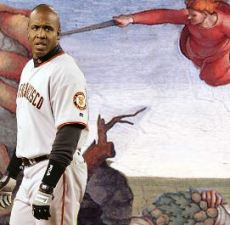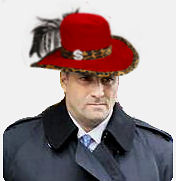In Barry’s Fall, We Sinned All
 Thursday, March 16, 2006 at 09:54AM
Thursday, March 16, 2006 at 09:54AM  Quote: "To me you never existed in the pantheon of baseball, you never hit more than 700 home runs, you never hit 73 home runs." Hal McCoy in the Dayton Daily News.
Quote: "To me you never existed in the pantheon of baseball, you never hit more than 700 home runs, you never hit 73 home runs." Hal McCoy in the Dayton Daily News.
Figure of Speech: asyndeton (a-SYN-de-ton), the conjunction skipper; also anaphora (an-AH-phor-a), the first-word repeater; also apodioxis (a-po-dee-OX-is), the figure of banishment.
If you can’t get enough of figures (and who can?), read the sports pages, where the only true Ciceronian speech survives. Sports columnist Hal McCoy throws figures at drug-induced slugger Barry Bonds like fastballs:
First, his asyndeton ("unconnected") eliminates conjunctions. It can sound poetic, or, in this case, angry. By skipping "and" between his clauses, McCoy sounds too indignant to take a breath.
Then he fires an anaphora ("carry back")—the favorite of preachers and demagogues—which repeats a word or phrase at the beginning of successive clauses.
His final pitch is the apodioxis ("chase away"), which rejects or banishes someone for his sins.
Three strikes, Bonds. You’re out.
Snappy Answer: "I don’t exist? There’s more of me than ever!"






